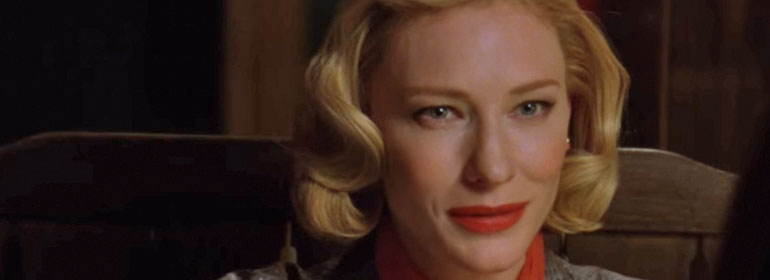Showered with praise, Carol’s pedigree comes with great expectations attached, and to a large extent it delivers, says Peter Dunne.
Todd Haynes continues with his series of stories of women trapped by 1950’s society (Far From Heaven, Mildred Pierce) with Carol, a love story starring Rooney Mara and Cate Blanchett. Hugely important for gay cinema, Carol looks set to follow in the hoof-prints of Brokeback Mountain and the march of Milk by breaking into the mainstream and gaining recognition from the Academy Awards. Carol is even rarer in that it is representing a lesbian romance, and one not made for the enjoyment of straight men.
Vastly underserved by mainstream cinema, the lesbian experience in film has often been presented as a foot note or sub-plot to the lives of gay male characters. It’s therefore heartening that the creators show integrity and a lack of sensationalism in this depiction of the burgeoning romance between two women in the repressive culture of 1950’s America. Carol, (Cate Blanchett), an older, married woman who is shopping for Christmas presents for her daughter, falls for the charms of Therese, the young woman employed at the toy store. Forced to stay under the radar for fear of repercussion, their romance slowly and tenderly finds its feet but is soon threatened by outside forces.
Carol may be the more experienced of the two, having discovered her true self years before, but it is she who is the more trapped – tied into an unwanted marriage with a disgruntled husband. Through Therese she begins to see the chance of a life with actual love, while Therese finally realises her own sexuality, something she hadn’t even imagined as a possibility. Along the way, the lovers must overcome the hurdles, hatred and repression society, and indeed family, forced upon lesbian women.

Based on Patricia Highsmith’s novel The Price Of Salt, one can’t help wonder why the filmmakers decided to rename the piece Carol instead of Therese, as it seems to diminish the importance of Mara, who was a surprise, but deserved winner of Best Actress at the Cannes Film Festival for her performance. While her supernaturally bright eyes and Snow White-like beauty are almost cartoonishly unreal, her realisation of Therese certainly isn’t. This young woman may be initially confused by her feelings but she is never ashamed of them, and Mara’s modern take on Therese’s journey is hugely refreshing. In smaller roles, Sarah Paulson is, as usual, so excellent as Carol’s confidante, Abby, that it’s still confounding why she’s always relegated to supporting roles. Kyle Chandler as Carol’s disgruntled husband, Harge, may be the vindictive bump on the road to love for our protagonists, but he delivers a sympathetic, and therefore understandable, performance.
Despite so many positives, Carol is a movie to be admired rather than adored. Marketed as a lush romance and a heart-stopping love story, the film is in fact rather chilly. It’s hard to be romantic when there is so little joy. Shot on film rather than digitally, the grainy, gritty vibe is unusual and sometimes welcomingly ugly. It’s difficult to swoon when the characters are often washed in green lights that make them look physically ill rather than love-sick. The journey to self-realisation and happiness for the women also becomes a bit of a plod towards the middle section, dragging its feet instead of picking up speed.
The real problem with the film, however, is Cate Blanchett. She isn’t acting here, she’s performing. Every movement is so choreographed, every sentence so carefully modulated, it seems she’s delivering a character for the stage, not the screen. And she’s performing for the people right in the back row. Sentences are delivered so portentously that if a person went in not sure what the film was about, they could be forgiven for believing that Carol wants to murder Therese, not seduce her. All that might be fine if the film were high camp, but while Blanchett is acting as if the film was made in the 1950’s, rather than just set in the 1950’s, no one else is.
Despite the opposing acting styles and the uneven tempo, it’s an admirable film that deserves to be seen, if not just for some fantastic performances and strong storytelling, then for the conclusion. Which, for not the obvious reasons, is so gracefully, finally, romantic, that the long journey is forgotten.
‘Carol’ is released on November 27.
© 2015 GCN (Gay Community News). All rights reserved.
Support GCN
GCN is a free, vital resource for Ireland’s LGBTQ+ community since 1988.
GCN is a trading name of National LGBT Federation CLG, a registered charity - Charity Number: 20034580.
GCN relies on the generous support of the community and allies to sustain the crucial work that we do. Producing GCN is costly, and, in an industry which has been hugely impacted by rising costs, we need your support to help sustain and grow this vital resource.
Supporting GCN for as little as €1.99 per month will help us continue our work as Ireland’s free, independent LGBTQ+ media.
